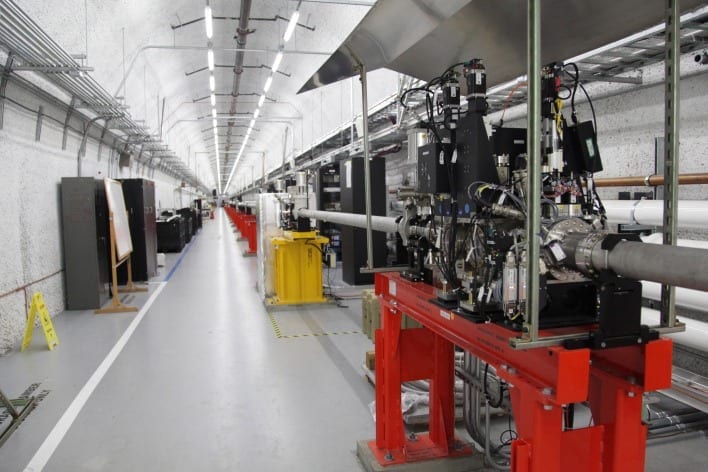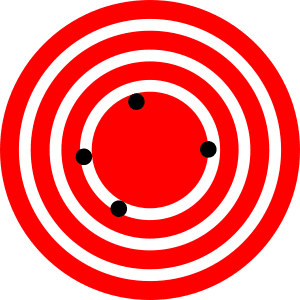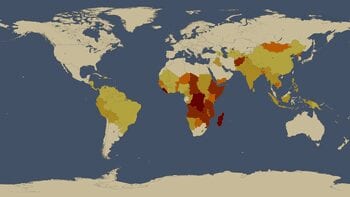One can switch the state of an electron’s orbit 10,000 times faster than you can switch the state of a transistor used in computing today
The demand for computing power is constantly rising, but we’re heading to the edge of the cliff in terms of increasing performance — both in terms of the physics of cramming more transistors on a chip and in terms of power consumption. We’ve covered plenty of different ways that researchers are trying to continue advancing Moore’s Law — this idea that the number of transistors (and thus the performance) on a chip doubles every 18 months — especially the far out there efforts that take traditional computer science and electronics and dump them in favor of using magnetic spin, quantum states or probabilistic logic.
We’re going to add a new impossible that might become possible to that list thanks to Joshua Turner, a physicist at the SLAC National Accelerator Laboratory, who has proposed using the orbits of electrons around the nucleus of an atom as a new means to generate the binary states (the charge or lack of a charge that transistors use today to generate zeros and ones) we use in computing. He calls this idea orbital computing and the big takeaway for engineers is that one can switch the state of an electron’s orbit 10,000 times faster than you can switch the state of a transistor used in computing today.
That means you can still have the features of computing in that you use binary programming, but you just can compute more in less time. To get us to his grand theory, Turner had to take the SXSW audience through how computing works, how transistors work, the structure of atoms, the behavior of subatomic particles and a bunch of background on X-rays.
X-rays are actually his specialty at SLAC, where he oversees experiments in the Linear accelerator to take pictures of subatomic particles in action. Those experiments have also led to the discovery of new materials and visualizations that could help computing in the nearer term. One is the discovery of a material that allows electrons to switch states really quickly that could improve magnetic random access memory speeds by a factor of thousand.
Another breakthrough is the ability to see what spin (positive or negative) electrons in a magnetic field have taken — which is akin to seeing what’s happening inside a transistor while it’s working. This helps engineers take the guesswork out of what some of the new breakthroughs in chip research might mean in the real world. One of the problems with working at the subatomic layer is that you can’t see what you are doing without expensive equipment.
A third breakthrough is the use of a lower-power terahertz laser to prompt a shift in the state of a magnetic spin of electrons. Like both the new material and the concept of orbital computing, this is a way to switch the state of an electron faster. The primary advantage here is that while we’ve known for a while that a laser can speed up a state change (and thus, speed up computing) those lasers require a lot of power. The terahertz breakthrough offers a boost in speed without requiring a huge power draw.
The Latest on: Orbital computing
[google_news title=”” keyword=”Orbital computing” num_posts=”10″ blurb_length=”0″ show_thumb=”left”]
via Google News
The Latest on: Orbital computing
- Gravitics to develop 'tactically responsive' orbital platforms for the Space Forceon April 25, 2024 at 12:21 pm
Space station module developer Gravitics scored a $1.7 million contract from the U.S. Space Force to develop orbital platforms to enable responsive space missions. The contract is part of a larger ...
- Space Environmentalism: Toward a Circular Economy Approach for Orbital Spaceon April 24, 2024 at 5:00 pm
As humanity ventures farther out into the universe, the vast expanse of orbital space, the region that spans from around 100 kilometers above the Earth’s surface to roughly 36,000 kilometers, presents ...
- There's a new theory about how one of earth's 'quasi-moons' war bornon April 24, 2024 at 1:47 pm
For nearly a decade, a near-Earth asteroid named Kamo’oalewa has invoked speculation over how it came to orbit the Sun in total synchrony with Earth as though it shares some special relationship with ...
- Orbital Cellulitis in Childrenon April 23, 2024 at 5:00 pm
Background: To review the epidemiology and management of orbital cellulitis in children. Methods: The medical records of children ≤18 years old and hospitalized from June 1, 1992, through May 31 ...
- Tailoring electron vortex beams with customizable intensity patterns by electron diffraction holographyon April 23, 2024 at 12:57 pm
A new research study from Opto-Electronic Advances discusses tailoring electron vortex beams with customizable intensity patterns by electron diffraction holography.
- Sidus Space Partners with Orbital Transports to Expand Market Reachon April 17, 2024 at 5:30 am
Sidus Space, Inc. (NASDAQ: SIDU) (the "Company" or "Sidus"), a multi-faceted Space and Data-as-a-Service satellite company, today announced it has joined Orbital Transports Partner Program to expand ...
- Terran Orbital Corporation (LLAP)on April 16, 2024 at 3:45 pm
TURIN, Italy, April 16, 2024--Tyvak International SRL ("Tyvak International"), a Torino, Italy-based subsidiary of Terran Orbital Corporation (NYSE: LLAP) and a leading European provider of nano ...
- Terran Orbital Corp LLAPon April 16, 2024 at 3:30 am
We sell different types of products and services to both investment professionals and individual investors. These products and services are usually sold through license agreements or subscriptions ...
- Orbital Invaderson April 12, 2024 at 4:42 am
All the Latest Game Footage and Images from Orbital Invaders Sci-Fi arcade game where the skill to react the situation and predict attack of enemies determine the outcome of battles.Fly around ...
- Sunday Conversation: Orbital On Revisiting Their First Two Albumson April 7, 2024 at 2:35 pm
Over the next two weekends, Saturday April 13 and April 20, to be specific, influential British duo Orbital will deliver ... I cracked open the Atari ST computer and tried all the floppy disks ...
via Bing News











